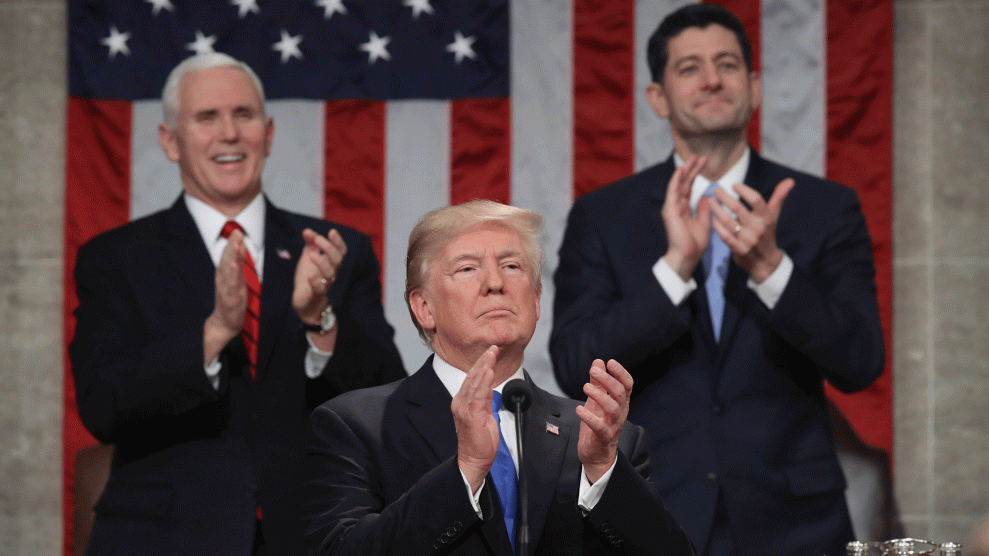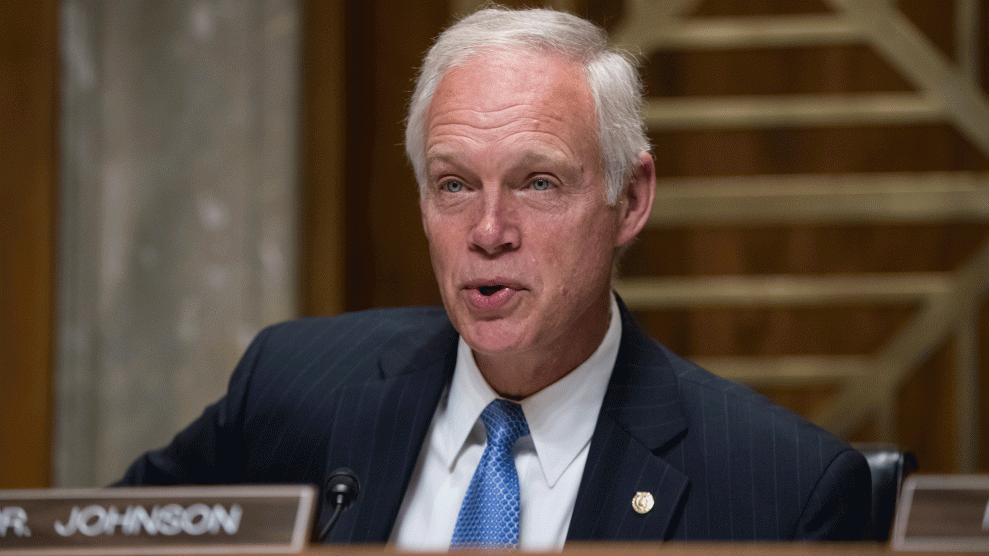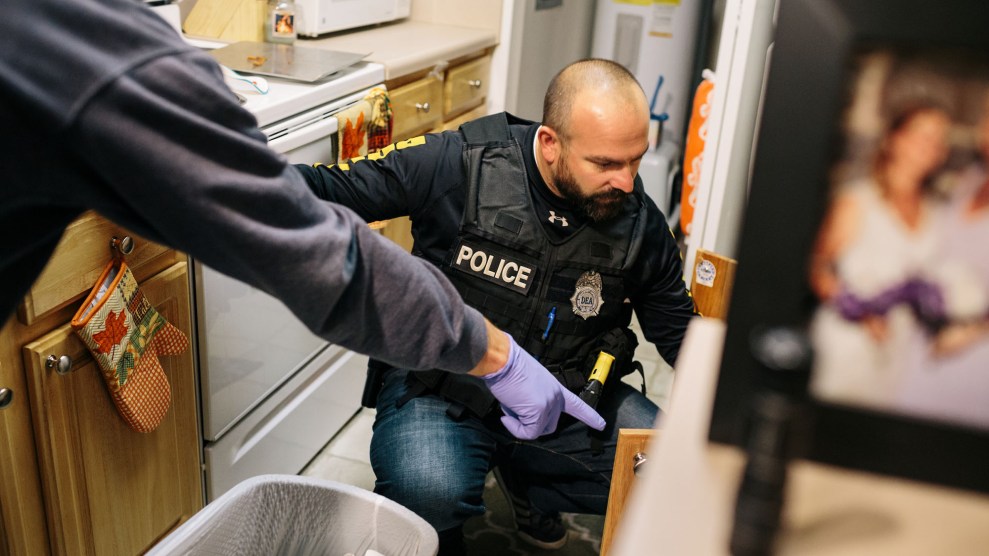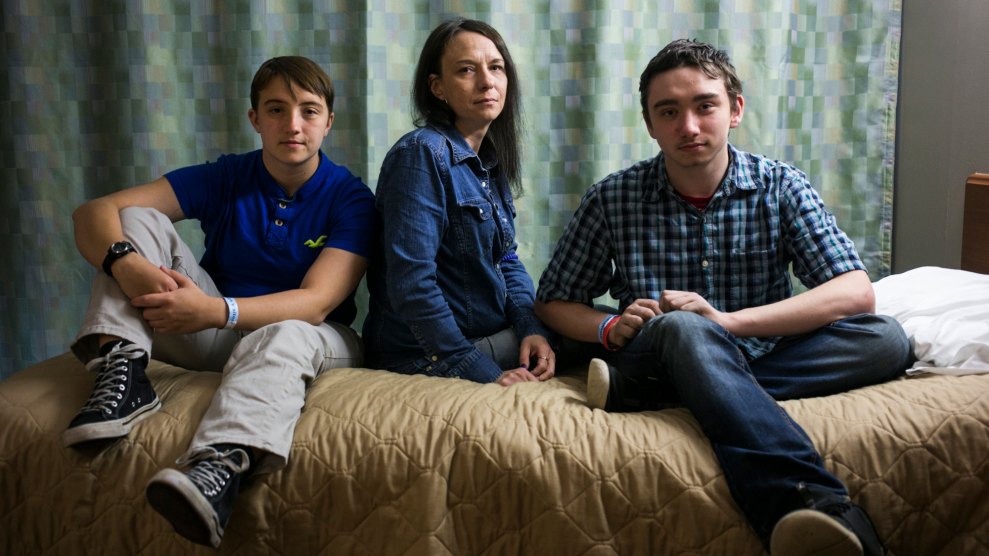
Win McNamee/AP
President Donald Trump promised during his State of the Union address Tuesday night to prevail in the battle against the opioid epidemic, pledging to be “much tougher on drug dealers and pushers” and help “get treatment for those in need.”
Trump has long vowed to prioritize the epidemic, which killed 64,000 Americans in 2016, promising to “spend the money” to treat addicted Americans. “The number of drug users and the addicted will start to tumble downward over a period of years,” he said in October, when he declared the crisis a public health emergency. “It will be a beautiful thing to see.”
Among his guests Tuesday night was Ryan Holets, an Albuquerque police officer who adopted the child—a girl named Hope—of a woman addicted to heroin. “She told him she did not know where to turn, but badly wanted a safe home for her baby,” Trump said. “In that moment, Ryan said he felt God speak to him: ‘You will do it—because you can.'”
But despite his rhetoric, Trump has so far done very little that experts think could make a dent in the drug crisis—and has actually pursued a number of policies that could make it worse. He’s repeatedly proposed cutting services that would help drug users and their children—programs such as Medicaid, the Administration for Children and Families, the Substance Abuse and Mental Health Services Administration, and the Temporary Assistance for Needy Families program. Meanwhile, Trump has provided no new funding to combat the epidemic.
So as we consider Trump’s State of the Union promise, let’s take a look at the administration’s track record so far:
Chipping away at Obamacare
The Affordable Care Act provided addiction treatment to millions, which researchers on the right and left agree is key to solving the drug crisis. (Just one example is Brandi, a recovering drug user who attributes her progress to her treatment coverage.) But, of course, Obamacare is a favorite target of the White House. And after several failed attempts to repeal and replace the legislation last year, the Trump administration has taken to slowly chipping away at its key components. The landmark tax legislation Republicans passed in December repeals the individual mandate, the part of Obamacare that requires individuals to buy health insurance or face a tax penalty. According to a report from the Congressional Budget Office, the repeal will increase the number of uninsured Americans by 13 million over the next 10 years. Of those 13 million, an estimated one-third—or about 4 million Americans—struggle with addiction or mental health.
Making matters worse, Trump announced earlier this month that states could impose work requirements for recipients of Medicaid, the nation’s largest addiction coverage provider. Administration officials said that states could make “reasonable modifications,” such as exempting those in addiction treatment from the work requirements. But public health advocates worry that the requirements will present yet another hurdle for drug users to overcome to access treatment.
Ignoring his opioid commission
Soon after taking office, Trump appointed a commission led by then-New Jersey Gov. Chris Christie (R) to guide his approach to the epidemic. Drug policy experts on both sides of the aisle commended the commission’s recommendations, which encouraged public health-oriented initiatives, such as expanding access to addiction treatment and non-opioid painkillers. Trump has instead taken a police-centered approach championed by Attorney General Jeff Sessions, awarding funding to law enforcement agencies to crack down on drug trafficking and assigning federal agents to disrupt illicit opioid sales online.
Back in August, Trump said his administration was moving towards declaring the epidemic a national state of emergency, another central recommendation of his opioid commission. Such a move would have unlocked millions of dollars in federal disaster funds. But two months later, Trump instead declared a “public health emergency,” which allows states more flexibility in how they use federal money but comes with no additional funding.
Proposing huge budget cuts
The Office of National Drug Control Policy coordinates federal prevention and treatment efforts. Yet Trump has yet to appoint a director—the so-called “drug czar”—to the office. Moreover, he has proposed dramatically reducing the office’s funding. Last May, a White House draft budget proposed slashing the office’s budget by a whopping 95 percent, a plan the administration later backpedaled on. Now, according to Politico, the administration again plans to cut funding for the office by 95 percent and relocate the office’s two main grant programs to the Department of Health and Human Services.

















